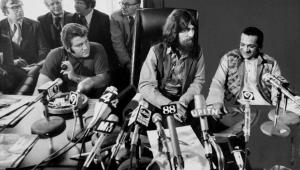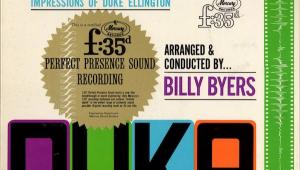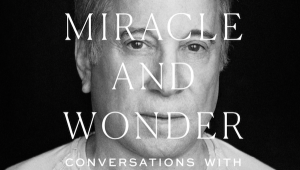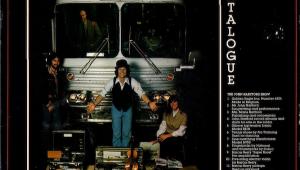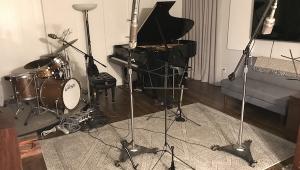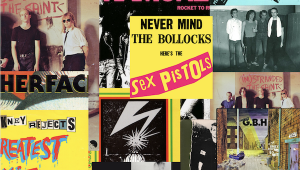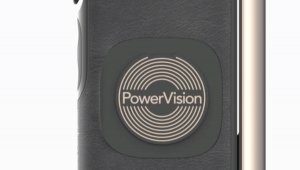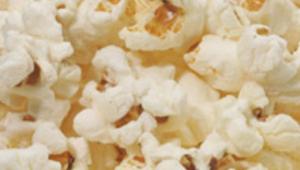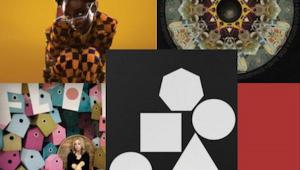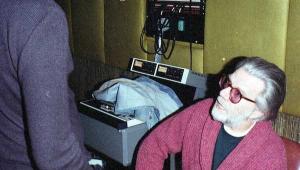Roger McGuinn Interview
RM: I think maybe we got too much flack for doing too many Dylan songs.
TA: It's just kind of a double hit, though, to lose Gene and then Dylan at one time.
RM: Well, it meant I got more songs on there.
TA: True. That's a good one. At the time that Gene left, I think the official start was of his fear of airplanes -- was that really what happened, or was there more to it than that?
RM: There's more to it than that. It was basically the fact that he was kinda fried. He was burned out and the fear of airplanes was just all of it coming to a head. He also had an ambitious streak, and he wanted to go off as a solo artist. Pickner and Dickson were grooming him to be the Elvis Presley. So, there was another sort of ...
TA: Distraction?
RM: A sinister plot. It didn't work out.
TA: Was there every any discussion about bringing in another fifth player, or did you guys want to stay with the four after he left?
RM: We decided to stay with four. We talked to the Beatles and they said that they had had five guys and they liked being four better. We said if it was good enough for them, it was good enough for us.
TA: And then, Chris Hillman got elevated to instant singer. Did that go fairly well? It seemed like he was little more reticent.
RM: He was a little shy, but he grew into it. Over the years, he's really gotten good.
TA: Oh, yeah. Sure. He's developed as great bass player, too. These records -- that's one of the things I noticed, playing these back-to-back, is how his bass skills evolve from one record to the next. It was like watching someone grow up. He really did such fabulous stuff.
RM: I agree. He's a real melodic bass player.
TA: "5D" is a very nicely arranged folk song, as wells as "Mountain Thyme" and "John Riley." So, you were instrumental in bringing those in?
RM: Yeah. Those were my arrangements.
TA: Real nice. Why was "Wild Mountain Thyme" not on the box set?
RM: I don't know. We just had so many things to juggle, I think it just got overlooked.
TA: The song "I Come and Stand at Every Door" was a very much more somber, statement kind of song than you guys normally did.
RM: It's a Pete Seeger influence. I got it from a Pete Seeger record. He had always been an influence and an inspiration to me, and I thought I'd put it on there. Actually, Pete asked me where I got it, too.
TA: That's pretty funny. How 'bout the song "I See You." That's something you wrote with Crosby.
RM: That's an early sessions, bubblegum type of song. I did like the jazzy kind of feel to it.
TA: Me, too. That's what I like.
RM: The lyrics are really weak, except for the ethereal parts.
TA: Where it slows down?
RM: No, we thought-talked ... it gets a little interesting that way.
TA: And you were doing some of the "Eight Miles High" style lead runs behind it all the way, too.
RM: I'd been playing around with that jazz, Coltrane type of influence. It kinda seeped into everything I did at that point.
TA: It's a nice track. Let's move on to the bonus tracks, if we can, for a minute here. The song "Why" was a flip side of "Eight Miles High" and then later showed up on Younger Than Yesterday, but was not on 5D . To me, it's a fairly strong song. Do you remember why it was omitted from the album?
RM: No. I have no idea why it was omitted.
TA: What's your opinion of the RCA versus the Columbia versions of "Eight Miles High?"
RM: I like them. I think the RCA has a little more fire, but I think we had been practicing it enough by the time we go t into the CBS studio that it came out a little cleaner. It got a little more musical tightness. They both have merit.
TA: Now that song was on its way to being a pretty successful song even before it was censored, right?
RM: The Gavin Report knocked it out.
TA: And that's unfortunate because you guys were kinda on a roll. It's a tremendous piece of music. It's amazing in some ways that it was successful because it was so different.
RM: It's funny, but I remember we were dealing with a female DJ in New York City. When the single came out, we played it for her and she said, "Oh. Where's the single?" I said, "That is the single." She just shook her head, like, "Yuch.
" TA: You guys did a lot of progressive things, none more than this song. The lyrical imagery, your guitar work, the whole structure of it was just so unlike anything else at the time. I would've been really curious to see how well it would have done had the censorship factor not come into play.
RM: It was getting up the charts. It was up to number twelve or something. It would've gone to the Top 10.
TA: It's amazing, considering the material.
RM: It was pretty abstract.
TA: It's a wonderful piece of music. Do you remember, it was credited to three people -- do you remember who did what?
RM: Gene came up with the chord changes, for the initial verses. And, Gene and I worked on the lyrics -- it was my idea to make it about the airplane ride over to England, and so we kinda worked on the lyrics. And Crosby helped with that, and then, basically, that was it. Then I did the guitar work. It was a Gene-rooted song, but Crosby and I helped.
TA: I know it was not a song about a drug experience, but you must have been aware that the phrase would conjure up that connotation.
RM: It did occur to us, yeah. We got what we deserved.
TA: I'm not trying to say that, I just wondered.
RM: Crazed hippies and all.
TA: Bad guys. How about the song, "I Know My Rider." What was the background on that one?
RM: It's an old folk song. We all knew it from playing around in the Village in different coffee houses.
TA: Was that intended to be a single at some point?
RM: I don't know. We were just trying different songs.
TA: The last one on this is the "John Riley" jam song.
RM: Oh, that's almost embarrassing. It's too experimental for my taste. I mean, it was just screwing around in the studio, but people get off on these things, so it's okay. Instrumentally speaking, I could have done better guitar work.
TA: Had you known the world would be listening to it, thirty years later ... It's interesting because it's one of things I talked to Bob Irwin about. With these kinds of releases, it's true that there's almost two different listening groups who buy these things. One is people who just want to buy nice music, the other is the collectors. And some of these things might not be as strong, but the collectors want to have everything that the group has put out.
RM: There's a nine CD bootleg set downtown. It has studio chatter and all the outakes of everything we ever did. Somebody stole the original masters of all the stuff we did.
TA: Okay, the last one here: Younger Than Yesterday. Obviously, the emergence of Chris Hillman here, as a writer and a singer is a big jump. Let me ask you one thing about 5D : did Chris sing much on that record?
RM: No.
TA: So he's just kinda feeling his oats a little bit, getting into it at that point. On Younger Than Yesterday, he did some lead vocals and things. Was that a gradual change or a major development?
RM: We were kind of a trio by then. Michael left right after this, but he didn't sing. Chris and I were the only singers. He had to jump into the harmony vocals slot when I sang lead and I had to harmonize when he sang lead. It was a good thing for Chris. We started writing together; we wrote a lot of songs together.
TA: Yes. "Rock and Roll Star" is a great song. It's another one that has stood the test of time very well.
RM: Thanks.
TA: The South African influence, with the percussion and the trumpet -- how did that come into play?
RM: Well, we'd known Hugh Masakela. At that point, we had a manager named Larry Spector, and Hugh was working with Larry, too. So, we knew Hugh, he was just around, and we admired his work and got him in there.
TA: The lyrics of the song have been talked about a lot over the years. How much of it is bitter versus tongue-in-cheek playful? What was the intent of the song?
RM: It was light-hearted, really. There was no bitterness intended, although people read that in. I guess because "Eight Miles High" had not gone where it could have, something like that. No, we weren't bitter at all. Our senses of humor were too dry.
TA: This was during the time that the Monkees' TV show was on, and they were big stars. Some people thought it was aimed at them -- I don't know if it was or not.
RM: Chris Hillman says it was, but I was writing it, too, and I wasn't thinking of them. I was just talking about the big turnover. We were looking through a teen magazine and there were all these pictures of people who had shown up, and then the next month there would be new ones. It was just funny to us.
TA: This is another tremendous album. Look at these recording charts -- this was done in about two weeks! That's just amazing, given how long it takes anyone to do one song nowadays. Do you feel you were in an unusually high period of creativity?
RM: We were being pushed into it. It was probably something we wouldn't have done on our own. But we were very creative for a burst of time there.
TA: You had a lot of good material on this record; probably more than you could use. "Have You Seen Her Face," the Hillman song ... you did a nice guitar part on that. A lot of seventh chords, it sounds like.
RM: Thank you. That's probably one of my only six-string leads on the recording. I'm real happy with the way that came out.
TA: It really compliments the song nicely. It's really tasteful. "Time Between" is one of your first country tunes.
RM: There you go. We started country rock at that point.
TA: Yes, and that's Clarence White playing the six-string on that one, right?
RM: Yes
TA: Was it a problem bringing in outside people like that?
RM: Not for me.
TA: "Everybody's Been Burned ..."
RM: That was just a Crosby thing.
TA: "Thoughts and Words," Roger, has got some backwards tracking. That had not been around much, back then. Who came up with that idea?
RM: The Beatles had done it before that. We were just playing around with their experiment/idea. I think it was Usher who did that.
TA: Were you using any synthesizer or electronic products?
RM: Yeah, we were using oscillators. It was pre-moog ... what was the year? '67? I got my first moog later that year. When was Monterey?
TA: Monterey was late '67.
RM: Yeah, I got my first moog right after Monterey 'cause I saw it at the Monterey festival. Paul Beaver had one up there, and he was selling them, and I bought one. So, we just missed the moog on this one. We were using oscillators, which is basically what a moog is.
TA: A tone generator.
RM: Yeah.
TA: One remarkable thing about The Byrds' music is even when you had all these diverse elements, they never stood out and dominated the music -- it was always very well integrated. You never lost the core of the song; the melody and the singing.
RM: It didn't feel like a gimmick.
TA: Exactly. It was always an adjunct or an adhancement to the song without taking over. "My Back Pages:" how was that selected to be on the record?
RM: The idea to do the song was Dickson's, ironically, even though he had been fired as our manager. I was driving up Laurel Canyon and we both had Porsches, and he pulled up next to me in his, rolled down the window and said, "Hey, Jim! You guys ought to do 'My Back Pages'- the Dylan song." So I went home and got the record and checked it out and learned it and rearranged it.
TA: Oh, yeah. It's very nice. It's a great tune. What did you think of the alternate version?
RM: I don't like it, myself. It's interesting because it's different. I think the way we released it is better.
TA: It's a collectors' piece, really.
RM: It's interesting because of the variation, but it's not better musically.
TA: And then, "Why," which is the last song. You didn't use the older version of the song. Do you have any feelings about this version versus the others?
RM: I think the other one was probably stronger. I don't remember. I'd have to listen to them back-to-back.
TA: The one on the back side of "Eight Miles High" has a really raga-like tone.
RM: Oh, I built a little amplifier at that point. I took a little cigar box and a walkie-talkie two-inch speaker and then I had the guts from an old Philips portable record player in there, with a battery. This thing really sustained, like a sitar-like, ringing type of sound. So, we recorded it through that.
TA: I see. That was real nice effect on that song. "Don't Make Waves" you and Chris wrote that for the movie?
RM: Yeah. As a joke.
TA: The movie was worse than the song, if that makes you feel any better. I saw it when it came out. It was horrible.
RM: I thought the movie and the song were meant for each other.
TA: What happened during the recording of "Lady Friend?"
RM: I can't remember much about it. (sings) Here it comes ... I like that. It's all Crosby, isn't it?
TA: It sounds like his voice on every vocal track.
RM: He kicked us out of the studio because we weren't good enough to be on it, so we said, "Okay, David. Go for it," so he did.
TA: It didn't sell very well, but I think it's a very nice song.
RM: It's a good song. I though he did some nice vocal gymnastics on it.
TA: Yes, he did. The last track is "Old John Robertson," which is the single version as opposed to the one that's on ....Notorious .I like this version better than with the phasing.
RM: I like the phasing of the orchestral piece. That was Terry Usher's idea, but I said I was into it. I thought the phasing gave it a really interesting quality. I remember we got that by using oscillators with two tape recorders, speeding one up and slowing one down. Usher didn't know how to accomplish that, so he asked the engineer and said that he wanted to get that "short-wave sound." The guy said, "Well, you take the two tape recorders and speed one up and slow it down." I was into it because of the technology aspect. I really did like the way it sounded.
TA: It certainly makes the song different, but I guess I'm more of a purist in this case. How about the use of the chamber group in the middle?
RM: That was Usher's idea, also. I actually wrote the score.
TA: Very nice.
RM: Thank you.
TA: Were you pretty happy with the way this came out?
RM: I liked it a lot.
TA: Crosby left between Younger Than Yesterday andNotorious..... . And then, you and Chris had to take things over. You also got a lot of critical acclaim for Notorious.... . It's very highly regarded. How do you feel about that one?
RM: I enjoyed working with Usher and it was great fun in the studio. We were kind of Beatles-influenced, I don't know if it was Revolver or Rubber Soul, but we were influenced by one of those. I think they'd released something that didn't have separations between the tracks, so I think that was the inspiration for that. It was just a real artistic expression, freedom of expression. It was a lot of fun to be able to do things that were off the wall like that.
TA: You guys did a lot of nice, tasteful orchestrations, harpsichord and things. Michael Clarke's departure has not been publicized the way Crosby's was. What factors were involved there?
RM: Oh, he was just tired of the whole thing -- the little girls weren't coming around as much any more and that was what he was in it for.
TA: I see. Well, that was why a lot of people got into rock music. Then Chris' cousin came in for a while, and that was when you guys cut Sweetheart .... Going from Notorious..... into the Sweetheart... country era -- that was a major shift even for you guys, with Chris and Graham Parsons kind of driving that?
RM: Graham kinda speared it into the country direction.
TA: With Graham as a fourth member, were you aware that he was that heavily into country music?
RM: I wasn't. In fact, I heard him as a jazz piano player.
TA: Wow. There's a switch! He was obviously able to do enough jazz piano to get through the audition, huh? I think I actually saw you guys years ago in Detroit and he was actually playing jazz piano. I think it was right after Notorious came out. But, how did you feel about the country music at the time, and how do you feel about it now?
RM: It took us a while to get a head of steam going with the country theme. I really liked it -- it was fun. I certainly enjoyed it. We went out to Nudie's, the rodeo tailor, and got some cowboy clothes and hats and I got a Cadillac, an El Dorado, and it was like a role.
TA: And then you released the single, "You Ain't Going Nowhere," which at the time was a little too radical for radio.
RM: It didn't go nowhere.
TA: But then you guys did a later release of the Nitty Gritty thing, didn't you?
RM: Yeah, we got a gold record on that, and a Grammy nomination.
TA: Which just goes to show you that you were ahead of the time. So many groups jumped onto what you did a few years later and were very successful.
RM: The Eagles.
TA: The unfairness of life, sometimes, huh? But still, you guys get the credit from many people.
RM: Yeah, but what would you do with more money? Get in more trouble.
TA: That's true. Were the original Byrds a better studio band or a stage band, in your opinion?
RM: They were a better studio band then a stage band, for the simple reason of lack of experience on the stage. We'd been in the studio for a year but we hadn't been on the stage for more than a month or two. When we first went out on the stage, the little girls were screaming because we had a number one hit, and you didn't have to worry about performing. But when they stopped screaming, they were listening, and that was a problem.
TA: What is your assessment, overall, of the box set?
RM: It came out well. I really enjoyed working on it, and I think it's a good monument to all that we did, although as you say there are some omissions of things that should have been on there.
TA: It's a nice collection of stuff. It's nice to see all these reissues, too, because it's all the original music plus more. Let's fast forward into the present here. Tell us a little about your current activities and what you're doing; any projects you're working on and all that.
RM: I've got a book on the back burner that's been percolating for years, and I tour and give concerts, but I've been concentrating this year on writing and doing demos and sending out CDs for a possible record deal, a new rock CD. Or, perhaps, a CD of my live historical shows that I've been doing -- it's kind of like a one-man play. I'm not sure which is going to come out first.
TA: And you also have a video instruction tape out now.
RM: Yes, that came out last month. It's on Homespun.
TA: Was that fun doing that? You've got that unique style -- I think it's a good venue and a good medium for you to do that. Do you have any plans for any future work with The Byrds?
RM: Absolutely not.
TA: That's unequivocal, uncategorical? You just don't want to do it anymore.
RM: No, I don't want to do that. I just want to be a solo artist. The Byrds are well-documented. I don't think we need any more from the Byrds.
TA: Did you enjoy doing the tracks for the box-set with those guys?
RM: Yeah, that was fun.
TA: Do you feel that the two activities are mutually exclusive -- doing something with them and also being a solo artist?
RM: In my case, I'd really prefer being solo. I really don't like being in a band situation.
TA: I respect you for standing by your viewpoint. As someone who really loves music, I know I speak for a lot of people when I say that I'm sorry because it would be great to hear more Byrds music.
RM: I get that all the time. I get along fine with Chris and David when we're not working together.
TA: Pals from a distance, so to speak. I'll fax you a copy when the article come out. Good luck to you!
RM: See you on the net!







